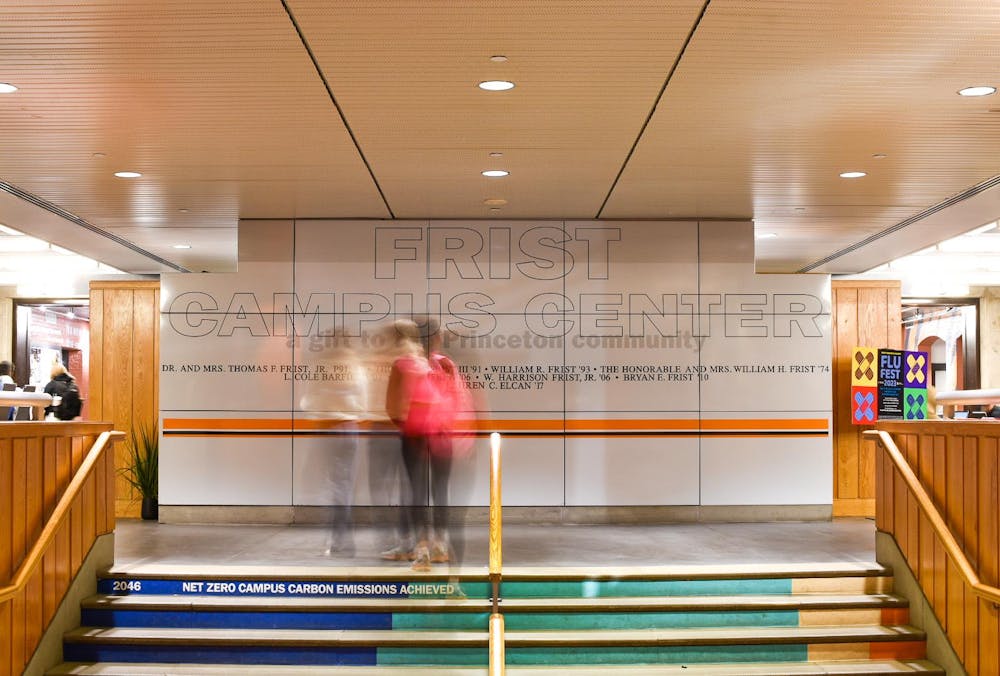In an interview with President Christopher Eisgruber ’83 in fall 2022, the Daily Princetonian asked whether he “saw there being a tension between the rigor and productivity demanded of Princeton students and student mental health.” Eisgruber’s response, in which he said that “high academic standards and the desire to achieve and be excellent is [nothing] but consistent with strong mental health,” caused many to raise eyebrows across campus, and aroused lively debate within the Opinion section of the ‘Prince.’
However, the News section’s subsequent imposition of an argument created in its own coverage — that there is an undisputed connection between the quality of student mental health and their academic commitments — is an irresponsible example of journalistic interference in contentious debates.
Last week, the ‘Prince’ split its coverage of the most recent Council of the Princeton University Community (CPUC) meeting into two articles: one highlighting questioning of the University’s strategies to protect student mental health, and the other discussing actions by Princeton Israeli Apartheid Divest (PIAD) at the meeting as well as at previous events the week before. By dividing these focus areas — calls for divestment from companies associated with Israel and calls for improvement to the campus community’s mental wellbeing — in relation to the CPUC meeting, the ‘Prince’ confines both to University oversight. The framing of this coverage suggests that Nassau Hall controls the mental health of its students in the same way it controls the endowment.
Furthermore, the coverage of the mental health discussion at the CPUC meeting fell into tired and lazy characterization of the issue that does not convey the heart of the debate and the true meaning of its discussants. The beginning of the piece states that “council members and members of the audience raised concerns about the intersection of academics and mental health.” However, the quote to which this summary refers, from CPUC Council member Judah Guggenheim ’25, states that he asked whether the University would “invest financially in mental health resources” alongside adding time and flexibility to the academic calendar.
What Guggenheim said does not suggest that he believes in an intersection between mental health and academics, but rather that he wonders how the University can include grace and adaptability in the expectations it sets for its students, which could in turn improve the conditions of their mental health.
When discussing how mental health can be looked after at an academic institution, the ‘Prince’ often posits a vague relationship that, by lacking specificity, indicates a meaningless debate. The broad term academics simply refers to a range of intellectual subjects which can be pursued through study. When posited as intersecting with mental health, a reciprocal relationship is implied: good or bad mental health can impact studies, and good or bad studies can impact mental health. The problem is, there’s no such thing as this latter relationship. Academics cannot be good or bad, well or unwell as mental health is. There must be a referent attached: what sphere of academics are we talking about, exactly?
Throughout the CPUC article, the ‘Prince’ failed to consistently introduce a specific facet of academic life that could be related to the community’s mental health. In response to the earlier quote from Guggenheim, the ‘Prince’ noted that Eisgruber challenged his “implication that academic rigor negatively affects student mental health.”
Yet later in the article, the ‘Prince’ abandoned “rigor” in its own writing, saying that Eisgruber denied a “correlation between academics and mental health” and taking for granted that there is such a thing. Indeed, ever since Eisgruber mentioned, at the prodding of the ‘Prince,’ academics and mental health in the same sentence, the combination of the two has become the new gotcha for any critique of the University, for the phrase is broad enough to include almost any facet of student life.

Such vague phrasing on this issue is typical of the ‘Prince.’ In an article on the debate between candidates for Undergraduate Student Government vice president last fall, the ‘Prince’ included the sub-head “Once again, academics takes precedence in mental health discussion.” Yet the candidates discussed the various stressors of University life that can impact mental health and questioned if changing the academic standards of the University would improve student mental health. Neither of these conversations demonstrates a “precedence” for academics, they simply fail to align with the truth as determined by the ‘Prince’: that there is an inverse relationship between the two, i.e. that good mental health equals reduced academics.
This debate is not, in fact, about academics at large — it’s about the stressors that arise in a University setting, which though primarily academic, is certainly not entirely that. In an op-ed following his now-infamous ‘Prince’ interview, Eisgruber discussed the imprecise definition of “academic rigor,” which he takes to mean “high standards of scholarly quality and achievement.”
The ‘Prince’ has gotten used to poorly phrasing a debate that began in its pages, in which the word academics was never used. When it continues to shape news around this debate, it must be precise with what exact problems those upon whom it reports are interacting with: the stressful pace of the academic calendar for example, or the high-expectations environment encouraged within Princeton at large.
Specificity in reporting is crucial: it ensures that journalism remains within the wheelhouse of the truth. To speak in broad language risks implying causality where no such proof exists. When the ‘Prince’ discusses the multifaceted debate around promoting mental health, it must remain neutral in its reporting, always taking direction from what is actually being argued over, not the debate with which it wants the community to engage.

Abigail Rabieh is a junior in the history department from Cambridge, Mass. She is the Public Editor at the ‘Prince,’ and writes to address issues of journalistic quality and ethics.
If you have questions or concerns regarding the paper’s coverage and standards or would like to see her cover a particular issue, please contact publiceditor[at]dailyprincetonian.com.








